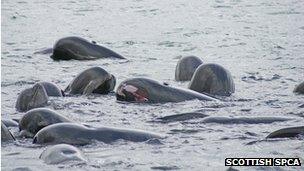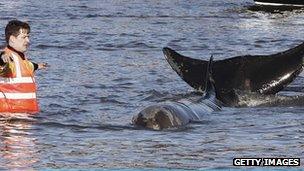Whales and dolphins stranded around UK 'total thousands'
- Published

In May around 100 pilot whales came close to becoming stranded off the coast of South Uist in the Western Isles
Almost 3,500 whales, dolphins and porpoises have been stranded on UK coastlines over the past six years, according to a study.
The Zoological Society of London (ZSL), which co-ordinated the work, says many had died of disease or starvation.
Overall it recorded a fall in the number of strandings but said that some still weren't being reported.
The Society has now launched a campaign to encourage the public to tell them when they find beached mammals.
Rob Deaville from ZSL said they had been studying cetacean species - whales, dolphins and porpoises - in British waters for the last 20 years to find out what human threats they faced.
"In terms of threats that we cause I mean by-catch, accidental catch by fishing nets is far and away the most significant one," he said.
"Also things like ships, being accidentally hit and killed by ships, and perhaps more insidious is animals that have died because of infectious disease, perhaps because of problems to do with chemical pollution."
Starvation
The report by the UK Cetacean Strandings Investigation Programme (CSIP) details the investigation of whales, dolphins, porpoises, marine turtles and basking sharks found stranded around the UK coast between 2005 and 2010. Seventeen different cetacean species were found.
As part of the project - funded by Department for Environment, Food and Rural Affairs, the Scottish Government and Welsh Government - figures for the number of animals found were collated and more than 750 post-mortem examinations were carried out to establish the most common causes of death.
The study found a decline in the number of reported strandings of harbour porpoises and common dolphins on UK shores, but recorded a small increase in strandings of some species like the humpback whale.
Of the harbour porpoises examined - around half had died either from starvation or infectious disease. Others had become entangled in fishing nets or had been attacked by bottlenose dolphins.
It total 3,430 stranded cetaceans were recorded- but that is down around 22% on the preceding five year period (2001-2005).
The largest number of reports were received in England (1,650), with a smaller number in Scotland (996), Wales (709) and Northern Ireland (46). But experts say this is not surprising as England has the longest coastline.
Defra and the devolved administrations have recently agreed to additional funding for a further three years study into UK strandings.

In January 2006 a northern bottle-nosed whale became stranded in the Thames at Battersea
'Distressing'
But Mr Deaville says they also need help from the public: "Without the help of the public over the last six years, we would not have been able to investigate strandings effectively.
"However, some strandings are still going unreported in the UK, so we are launching a new campaign to encourage more people to report stranded animals to us."
The CSIP says public reports of strandings have enabled it to build up a vast database of information that is shared with scientists across the world.
It has also helped generate many important discoveries, including the detection of persistently high levels of banned polychlorinated biphenyls (PCBs) - chemical contaminants - in bottlenose dolphins and killer whales.
Thousands of leaflets, external containing information on how to identify stranded animals will be distributed around the coastline and made available online, to help obtain more accurate reports.
The Environment and Fisheries minister Richard Benyon said "Whale and dolphin strandings are distressing and we need to understand why they happen and what can be done to prevent them.
"The UK Cetacean Strandings Investigation Programme is carrying out valuable work on whale and dolphin strandings which will help shed more light on this issue so that we can reduce the incidence of strandings in the future."
- Published5 October 2011
- Published29 September 2011
- Published23 July 2011